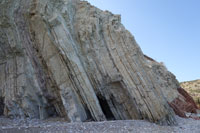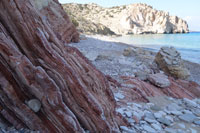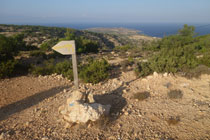|
Home
Page 1/8
Page 2/8
Pages 3-8 under construction
|
Gavdos Island, a Lifted and Tilted Aegean Crustal
Block
Webpage 2/7
Text, photography: Annemieke van Roekel, geoscience journalist
More articles: www.vuurberg.nl.
Shelter behind the steep southern coast
On historical maps we come across Gavdos in various shapes and names.
Gavdos is mentioned in the Bible (Acts 27). The Apostle Paul anchored his
ship there to escape the infamous winter storm of Eurakylon when, on his way
to Rome, he was unable to reach the ancient port of Phoenix in south-western
Crete. Fik Meijer, Professor Emeritus of Ancient History at the University of Amsterdam,
describes Paul's voyages (Meijer, 2012): "Despite the storm, the captain had managed to find temporary
shelter on a high coast. In the manuscripts, this island is
called C(l)auda or K(l)auda. Its southern coast rises more than
300 meters high and its slopes head northwards. A good place to find
shelter from the harsh northern winds."
Horsts and graben
Both Crete and Gavdos are made up of a collection of horsts and grabens,
geological structures indicating tensional forces and crustal stretching.
The seafloor separating the two islands, at depths of more than 1 km, is also composed
of such blocks. Strike-slip and reverse faults, a result of compression, have been
present here since the Pleistocene. The area is still seismically active due to
ongoing subduction.
"The tilting of the 'Gavdos block', which resulted in the characteristic shape
of the island, must have taken place around 11 million years ago," explains Jan Willem
Zachariasse, geologist / micropaleontologist at the Department of Geosciences at Utrecht
University in the Netherlands. "Because of this tilt, the older Pindos rocks, which form
the base of Gavdos, are visible all along the southern side"."


Fig. 3 and 4. Tilted Pindos limestone (so-called nappes)
on Lakoudi Beach. Photo's: A. van Roekel.
Figure 5 and textbox not translated.
Copyright: Annemieke van Roekel
Last update: 13 April 2025
|


